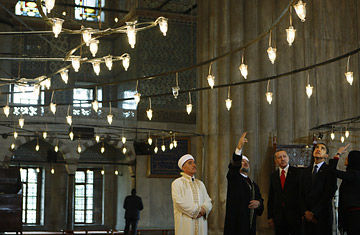
President Obama, second from right, is accompanied by Turkish Prime Minister Recep Tayyip Erdogan, center, as he visits the Blue Mosque in Istanbul
"Finding common ground," "building bridges" and "coming together" — these are the by now familiar-sounding terms of U.S. President Barack Obama's foreign policy. On a two-day visit to Turkey, a mainly Muslim country deeply divided over the role of Islam in politics, expanding democratic rights and enacting European Union reforms, the President showed how it's done. From minority Christian leaders and Muslim mufti to Kurdish politicians and right-wing nationalists, Obama met with vastly disparate sections of Turkish society and managed to earn back at least some of the goodwill lost in recent years.
"He made all camps happy, but he also gave everyone something to think about," says Turkish newspaper columnist Cuneyt Ulsever of Obama's first day in the capital, Ankara, where he addressed the parliament and met with leaders. "He met with the nationalist opposition but said 'Deal with your past.' He honored the government and hugged the President but asked for progress on normalizing relations with Armenia and improving Kurdish rights. For the secularists, he emphasized Turkey's secular identity but also spoke of respect for Islam's rich history." (See pictures of the Obamas abroad.)
The something-for-everyone approach appears to have worked. While anti-American sentiment among Turks rose to historic highs under President George W. Bush, polls show Obama with an approval rating in Turkey above 50%. Even the typically antagonistic Turkish press — left, right, secularist and Islamist — were united in their praise on Tuesday. "He won our hearts," read the banner headline on the mainstream daily Vatan. More important, all referred to Obama's message urging democratic progress. "We must all change," said the top-selling Hurriyet.
In terms of getting that message across, a good dose of honesty helped. "He called for change but began with himself, pointing out the shortcomings of the U.S. in terms of dealing with its racial history, for example," says Hakan Altinay, director of the Open Society Institute in Istanbul. "That disarmed everyone. After years of the U.S. taking a superior approach to the rest of the world, he put himself on the same level as anyone else, and that really worked." (See pictures from the streets of Istanbul.)
Obama also used his first visit to a Muslim country to send a message of reconciliation to the greater Islamic world. "America is not, and will never be, at war with Islam," he declared in his address to Turkish MPs. Syrian Foreign Minister Walid al-Moallem said Obama's speech "reflects a clear attention toward the two-state solution" for Israel and the Palestinians and described Obama's words as "important" and "positive."
It may have helped that Obama introduced a personal tone to his appeal. Introduced as "Barack Hussein Obama" before his parliamentary speech, he referred to his own identity as the son of a Kenyan Muslim and his upbringing in Indonesia. "The United States has been enriched by Muslim Americans," he told the Turkish deputies. "Many other Americans have Muslims in their family or have lived in a Muslim-majority country." (See pictures of Obama's family tree.)
Pausing for effect, he added, "I know, because I am one of them." Applause broke out in the chambers.
"President Obama sees the large and painful rift that developed between the U.S. and the Muslim world during the Bush presidency as damaging to the world and as a threat to American security," says Hady Amr, director of the Brookings Center in Doha, Qatar. "Obama seeks to be a transformative figure in healing the rift between the U.S. and the Muslim world and is harnessing his personal history — as an America born to an immigrant Muslim father from one part of the world, who spent part of his childhood growing up in another part of the Muslim world."
On his second day, Obama used the symbolism of Istanbul — the former seat of both the Byzantine and Ottoman empires and a city that bridges Europe and Asia — to full effect. He toured the historic Blue Mosque and Hagia Sophia (a church converted into a mosque and now a museum), met with religious leaders of all faiths and held a town-hall meeting with 100 university students. He also reiterated his commitment to a two-state solution in the Middle East, despite the potential roadblocks posed by the new Israeli government under Benjamin Netanyahu. "Peace in the Middle East is possible," he told students, adding that both sides would need to make compromises.
"Obama showed respect for Islam," says Open Society's Altinay. "But the prism by which the Muslim world will judge him is Palestine. This is a great start, but we need to see more."
Only time will tell whether Ankara has accepted that in order to be a "model partner," in Obama's words, it must also implement democratic reforms and address the murkier aspects of its history. On Tuesday, a nationalist Turkish leader said he wouldn't "tolerate the U.S. President's lack of courtesy" in calling on Turkey to reckon with its past, resolve its dispute with neighbor Armenia and reopen their shared border. But for now, "this is the best foreign policy opportunity Turkey has had in years," says Rusen Cakir, a Turkish expert in Islamic affairs.
